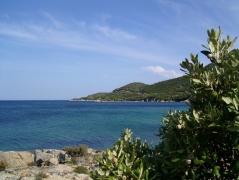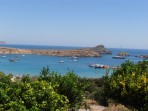Free Rhodes - Rhodes island

In 1948, Rhodes finally became part of Greece and since then, tourism has been building and growing on the island. The first luxury hotels were built here, and the number of hotels is constantly increasing so that this popular destination is able to meet the demand of tourists. In addition to tourism, Rhodes' economy is also focused on agriculture, with people working in this sector engaged in crop production, cattle breeding, fishing and winemaking.
Since the mid-20th century, Greece has been orienting itself towards Western democracies and entering into alliances. In 1952 it became a member of the North Atlantic Treaty Organisation (NATO) and two years later one of the founding members of the European Organisation for Nuclear Research (CERN). In 1981, Greece joined the European Communities, which can be described as a precursor to today's European Union. Greece is thus one of the founding members of the European Union (EU). In 2002, the euro was introduced in Greece, replacing the existing national currency, the drachma.
Changes were also taking place in Greece's internal political affairs, with a knock-on effect on its islands. Between 1967 and 1974, Greece was a military dictatorship in which many political freedoms were curtailed and the Greek king was forced to leave the country. The period of military dictatorship ended in 1974 with democratic elections coupled with a referendum. In it, Greeks voted to abolish the monarchy and introduce parliamentary democracy.
As for the capital of Rhodes, plans for a new city, which had already been proposed by the Italians in the first half of the 20th century, were approved in 1957. Since 1960, the medieval city of Rhodes has been a protected monument and in 1988 it was inscribed on the UNESCO World Heritage List.
But even a country as sunny and laid-back as Greece is not without financial and political problems. At the beginning of the 21st century, two things plagued it most - the debt crisis and refugees. The Greek financial crisis stemmed primarily from the irresponsibility of the governments there in seeking to join the so-called eurozone quickly, while at the same time government officials tolerated excessive state spending. This led Greece into a debt trap and, subsequently, into conflict with the European Union, as it was unable to meet its obligations. In order to obtain the necessary loans, it was forced to take certain restrictive measures. Moreover, the situation in Greece was exacerbated in 2016 by the Europe-wide problem associated with the huge wave of migration. Refugees arriving on mainland Greece and the Greek islands are mainly coming here via Turkey. Athens has been the hardest hit, followed by Lesvos, Chios and Kos. Rhodes has not been significantly affected.
However, the Greek islands continue to live their own peaceful and friendly lives and will not allow these problems to spoil the impression of their holidays for tourists.
Did you visit this place and do you have some additional informations, interessting observation or photos?




